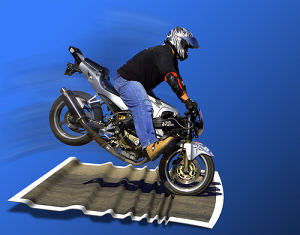The "Duh!" thread (aka the Doh! thread)
-
I have just found by accident that you can drag nested groups and components in the outliner from one to another and it keeps its location.

-
Ooh! That's nice! I've never used the Outliner much, but that's a nice observation.
+1 from me! -
Yes, highlighting and moving containers within the Outliner works very much like Cut+PasteInPlace when you move groups/instances between 'parents' - just MUCH easier...
It's also a useful way to open a nested container for editing, just find it 'by name' in the Outliner [benefit of naming sensibly!] and then select it and double-click it; and it's also best if View > Component Edit > Hide Rest of Model is toggled ON so you can see what you are doing [a shortcut-key to toggle this is de riguer]... -
Just found a new one. You can copy a line over and type 10', then, after hitting enter you can type /10 to get 10 equally spaced lines.
I have been doing that as two separate functions forever (copying the line 10' to get the spacing right then copying it back and snapping it to the other line 10' away and THEN hitting /10).
-Brodie
-
... and if you are not satisfy you can continue "*" "/" with any unity even different than settings untill taking another tool!

-
@panixia said:
just discovered a DOH feature of the selection tool..
if you drag a selection rectangle from left to right it selects only the items completely wrapped in the rectangle, but if you drag the rectangle from right toward left,then also the items wich are only touched (but not fully wrapped) by the rectangle are selected.. never noticed it before..
This is important to know also because it's one of the few things that tends to be consistent across most 3D software applications.
-
Ctrl (in Windows) while orbiting lets me turn my model every which way! Fairly useless as an architectural user but a boon for modellers who make widgets. Doh!
-
That's a "designed feature": Suspending the gravity setting
-
Sort of bootleg Camera Roll. I have used it to get a particular position for precise selection in a busy model. Of course, you could just do a bunch of layering and hiding to avoid this need altogether.
-
@gaieus said:
That's a "designed feature": Suspending the gravity setting
I use it for portrait-orientated renders...very useful.
-
@mikefjaguar said:
Ctrl (in Windows) while orbiting lets me turn my model every which way! Fairly useless as an architectural user but ......... Doh!
Rolling the camera (by holding down [Ctrl] when orbiting), to position your model in such a way on screen sometimes helps in order to have the selection window enclose what you want it to select. With gravity ON you might not be able to make that special selection.
-
...and when you Press the SpaceBar that stop it vigorously!


-
@gaieus said:
That's a "designed feature": Suspending the gravity setting
ugh, i think i just made myself travel sick trying that out.
-
if you are trying to draw something small and the clipping plane is getting in the way, change to parallel projection view.
-
I often find I get clipping issues more quickly with parallel view...
-
I'm on board with the parallel projection. I find that when you initially change to PP you'll get some bad clipping, but if you select your geometry and then zoom extents the clipping goes away and you can zoom in as much as you want.
-Brodie
-
Left, Right, Up arrows lock the Red Green Blue Axis when using move! How did it take me 7 years to figure this one out!
-
Seven years!
You should read the manual, just in case.

http://support.google.com/sketchup/bin/answer.py?hl=en&answer=94862&topic=2458142&ctx=topic
-
There's a manual?

-
@gilles said:
Seven years!
You should read the manual, just in case.

http://support.google.com/sketchup/bin/answer.py?hl=en&answer=94862&topic=2458142&ctx=topic
Useful reading but here it lacks the information about how to use to rotate a group or component accurately according to the current drawing axes system with angle input.
Also I couldn't find anything about moving vertices. And even more, while doing so, how to lock moving a vertex to its own edge's direction. (=hover over the edge first, press [Shift], only then move the vertex)
Advertisement







